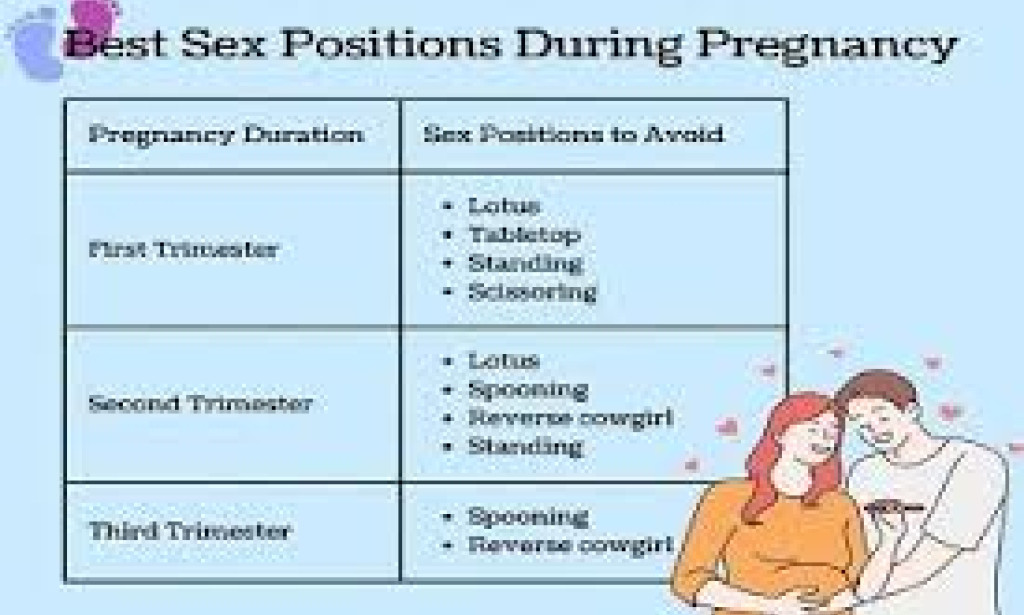Sexual Activity During Pregnancy
Physical Changes: Pregnancy brings significant hormonal and physical changes that can influence sexual desire and activity. Some women may experience increased libido due to hormonal fluctuations, while others may find that their interest in sex decreases due to nausea, fatigue, or discomfort.

Safety and Concerns: Many healthcare providers consider sexual activity safe during most pregnancies, as long as there are no complications. However, it's essential for partners to communicate openly about comfort levels. Certain conditions, like placenta previa or risk of preterm labor, may lead to recommendations to avoid intercourse.
Positions and Comfort: As the pregnancy progresses, certain sexual positions may become uncomfortable. Couples often explore different positions that accommodate the growing belly. Side-lying positions can be comfortable for both partners.
Emotional Aspects: Pregnancy can heighten emotions, which might affect intimacy. Some couples report feeling more connected, while others may struggle with changes in body image or mood swings. Open communication about feelings, needs, and boundaries is crucial.
Changes in Relationship Dynamics
Connection and Intimacy: For many couples, pregnancy can deepen their emotional connection. The shared experience of preparing for a baby can enhance intimacy. However, it may also bring stress that can impact the relationship, necessitating support and understanding.
Partner's Experience: It's important to recognize that partners (especially non-pregnant ones) may also experience emotional and physical changes. They might feel excitement, anxiety, or even jealousy regarding the changes in their partner’s body and focus.
Navigating New Roles: As couples prepare for parenthood, they often begin to navigate new roles and responsibilities. This transition can impact how they relate to one another, both sexually and emotionally.

Impact on Mental Health
Anxiety and Stress: Concerns about pregnancy, childbirth, and parenting can lead to increased anxiety, which may affect sexual desire and intimacy. Couples may benefit from counseling or support groups to address these feelings.
Body Image: Pregnancy can significantly alter a woman’s body, leading to various feelings about body image. Partners should be sensitive to these changes and foster an environment of acceptance and love.
Postpartum Considerations: After childbirth, physical and emotional recovery can influence sexual activity. Hormonal changes, healing from delivery, and the demands of a newborn can lead to decreased libido or discomfort during sex.
Sexual Health Considerations
Communication with Healthcare Providers: It’s vital for expectant parents to discuss any sexual health concerns with their healthcare providers. Regular check-ups can ensure both physical and emotional well-being during pregnancy.
Contraception After Pregnancy: Once the baby is born, couples should consider contraception options, as fertility can return quickly after childbirth. Understanding family planning is crucial for future pregnancies.
Conclusion
Sexuality during pregnancy is a multifaceted experience influenced by physical, emotional, and relational factors. Open communication between partners, along with professional guidance when needed, can help navigate this unique phase of life, fostering intimacy and connection as they prepare to welcome a new child.
Detailed Physical Changes
Hormonal Influences: Pregnancy triggers a surge in hormones such as progesterone and estrogen. These changes can lead to increased blood flow to the pelvic region, often enhancing sexual arousal. Some women may find that they experience heightened sensitivity or different types of orgasms.
Physical Discomforts: Common pregnancy symptoms, such as nausea, back pain, and fatigue, can create barriers to sexual activity. The growing belly may also cause discomfort with certain positions, leading couples to explore alternatives that are more comfortable.
Breast Changes: Many women experience changes in their breasts during pregnancy, including increased size and tenderness. For some, this can heighten sexual arousal; for others, it may create discomfort. Communication about preferences is essential.
Vaginal Changes: Increased blood flow can lead to greater vaginal lubrication, which some may find pleasurable. However, hormonal changes can also cause dryness or sensitivity, making it important for couples to be attentive to each other’s needs.
Emotional Dynamics and Mental Health
Intimacy Beyond Sex: Pregnancy can shift the focus of intimacy from sexual activity to emotional bonding. Activities like cuddling, kissing, and simply spending time together can strengthen the connection between partners.

Fear and Anxiety: Concerns about the baby’s health, financial stability, and parenting skills can create stress that may diminish sexual desire. It’s crucial for partners to support each other emotionally, validating fears and anxieties.
Postpartum Depression (PPD): Some women may experience PPD, which can significantly impact sexual desire and intimacy. Awareness and support from partners, along with professional help, can be essential in addressing these challenges.
Navigating Relationship Challenges
Communication Skills: Open dialogue about desires, boundaries, and any discomfort can help partners feel more connected. Discussing feelings related to body image or anxiety about the upcoming transition to parenthood can also strengthen the relationship.
Balancing Priorities: As partners prepare for a new baby, they may find it challenging to prioritize their relationship. Scheduling time for intimacy or date nights can be beneficial, helping to maintain connection amidst the changes.
Exploring New Dynamics: Pregnancy often leads to shifts in power dynamics within a relationship. Partners may need to negotiate responsibilities differently, which can affect emotional intimacy and sexual chemistry.
Considerations for Postpartum Intimacy
Healing and Recovery: After childbirth, physical recovery varies. Factors such as the type of delivery (vaginal vs. cesarean) and any complications can influence the timeline for resuming sexual activity. It’s important for couples to be patient and allow time for healing.
Body Image Postpartum: Just as pregnancy alters body perception, the postpartum period can bring its own set of body image challenges. Encouraging acceptance and celebrating the body’s changes can help improve intimacy and sexual desire.
Gradual Resumption of Sexual Activity: When couples feel ready to resume sexual activity, it’s often recommended to start slowly. Gentle exploration and communication about comfort levels can ease the transition back to intimacy.
Contraceptive Planning: After giving birth, discussing contraceptive options is essential, as fertility can return sooner than expected. Understanding family planning can help couples navigate their desires for future children.
Cultural and Societal Influences
Cultural Norms: Attitudes toward sexuality during pregnancy vary widely across cultures. Some cultures may embrace open discussions about sexuality and pregnancy, while others may impose restrictions or taboos, impacting how couples navigate these topics.
Support Systems: Engaging with support networks, such as family, friends, or parenting groups, can provide valuable insights and encouragement. These networks can help couples share experiences and gain perspective on intimacy during pregnancy.
The interplay of sexuality and pregnancy encompasses a wide range of physical, emotional, and relational factors. Understanding these dynamics can enhance intimacy and strengthen partnerships during this transformative period. Open communication, mutual support, and a willingness to explore new dimensions of the relationship can foster a fulfilling experience for both partners as they embark on the journey of parenthood together.


You must be logged in to post a comment.